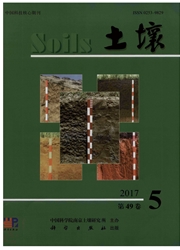

 中文摘要:
中文摘要:
选取贵阳市东郊7种植被下土壤,测定了微生物群落功能(Biolog法)和13种土壤特性,采用主成分分析和回归分析方法,研究了土壤特性对微生物群落功能的影响。结果表明,土壤特性解释了土壤微生物底物利用变异的77.9%和土壤微生物功能多样性的全部变异,其中,土壤pH、有效P、速效K、有机C、水解N和溶解性有机C分别解释了底物利用的48.4%、15.9%、5.9%、5.7%、1.6%和O.4%;有效P、速效K、有机C和全N分别解释了微生物功能多样性指标(H′)变异的67.4%、27.7%、4.7%和0.2%,表明土壤特性对微生物底物利用和功能多样性有决定性影响。
 英文摘要:
英文摘要:
Soil samples under seven different vegetation types were collected from Guiyang city and thirteen soil characteristics were measured to quantify the effects of soil characteristics on microbial function. Results showed that 77.9% of the variation in substrate utilization and total variation in functional diversity could be explained by soil indices characteristics, among which soil pH, Olsen-P, available potassium, soil organic carbon, hydrolysable nitrogen and dissolved oqganic carbon explained 48.4%, 15.9%, 5.9%, 5.7%, 1.6% and 0.4% of the variation in substrate utilization respectively, while Olsen-P, available potassium, soil organic carbon, total nitrogen explained 67.4%, 27.7%, 4.7% and 0.2% of the variation in functional diversity respectively, which suggested microbial function measured by Biolog GN plate was mostly determined by soil characteristics.
 同期刊论文项目
同期刊论文项目
 同项目期刊论文
同项目期刊论文
 Phosphorus enhances Al resistance in Al-resistant Lespedeza bicolor but not in Al-sensitive L. cunea
Phosphorus enhances Al resistance in Al-resistant Lespedeza bicolor but not in Al-sensitive L. cunea Hexachlorobenzene dechlorination as affected by organic fertilizer and urea applications in two rice
Hexachlorobenzene dechlorination as affected by organic fertilizer and urea applications in two rice Enhanced removal of polychlorinated biphenyls from alfalfa rhizosphere soil i a field study: the imp
Enhanced removal of polychlorinated biphenyls from alfalfa rhizosphere soil i a field study: the imp Influence of arbuscular mycorrhiza and rhizobium on phytoremediation by alfalfa of an agricultural s
Influence of arbuscular mycorrhiza and rhizobium on phytoremediation by alfalfa of an agricultural s Ammonium under solution culture alleviates aluminum toxicity in rice and reduces aluminum accumulati
Ammonium under solution culture alleviates aluminum toxicity in rice and reduces aluminum accumulati Effects of soil moisture, temperature, and nitrogen fertilization on soil respiration and nitrous ox
Effects of soil moisture, temperature, and nitrogen fertilization on soil respiration and nitrous ox Landscape analysis of dynamic soil erosion in subtropical China : a case study in Xingguo County , J
Landscape analysis of dynamic soil erosion in subtropical China : a case study in Xingguo County , J Methane and nitrous oxide emissions from rice paddy soil as influenced by timing of application of h
Methane and nitrous oxide emissions from rice paddy soil as influenced by timing of application of h Global estimations of the inventory and mitigation potential of methane emissions from rice cultivat
Global estimations of the inventory and mitigation potential of methane emissions from rice cultivat Quantifying methane emissions from rice fields in Taihu Lake region, China by coupling detailed soil
Quantifying methane emissions from rice fields in Taihu Lake region, China by coupling detailed soil Organochlorine Pesticides (OCPs) in Soils under different land usage in the Taihu Lake Region, P. R.
Organochlorine Pesticides (OCPs) in Soils under different land usage in the Taihu Lake Region, P. R. Short-term effects of wheat straw incorporation into paddy field as affected by rice transplanting t
Short-term effects of wheat straw incorporation into paddy field as affected by rice transplanting t Root phosphate exudation and pH shift in the rhizosphere are not responsible for aluminum resistance
Root phosphate exudation and pH shift in the rhizosphere are not responsible for aluminum resistance Uncertainty assessment of mapping mercury contaminated soils of a rapidly industrializing city in th
Uncertainty assessment of mapping mercury contaminated soils of a rapidly industrializing city in th 期刊信息
期刊信息
